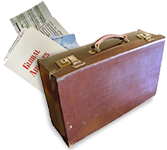Watching United Airlines cancel more than 600 flights at the beginning of Christmas week, I was glad that I was flying Frontier Airlines to Denver later in the week for a holiday ski vacation. The US Dept of Transportation’s latest Air Travel Consumer Report supported this feeling, showing Frontier with the lowest rate of canceled flights in November 2007. However, I was less thrilled when I found myself waiting almost an hour in Denver and O’Hare for Frontier’s luggage carousels to disgorge my family’s checked luggage.
As airlines grasp at profitability in the face of $100/barrel oil, they are tightly optimizing their cost structures. Their operations don’t have what project managers call “slack”. In this case, the spare capacity or resources to handle less-than-ideal circumstances.
United blames what they said was the worst December weather in company’s history for the incredible number of flight cancellations and delays during Christmas week. However, American and Southwest Airlines both managed to face the same weather issues at their Chicago hubs with only a handful of cancellations — United needed to cancel over 140 Chicago flights by Christmas Eve, while American dropped 11 flights and Southwest lost only 4. United’s airline pilots union says the problem wasn’t weather, it was lack of pilots. A union spokesman said, “They don’t have enough people. A little bit of a burp, and boom, they’re hammered.” United could have built in buffers — some slack — into their December crew schedules, but then would’ve lost money if the buffers weren’t needed. United gambled and it lost.
Lack of slack isn’t just an airline problem. On New Year’s Eve, snow, high winds and avalanche danger closed Interstate 70 between Denver and Vail ski area, stranding over 2,000 travelers. Many of those travelers were heading down to Denver airport on shuttle services for flights home. When I-70 closed, shuttle customers were dropped at hotels and temporary shelters without transport to the airport when the road re-opened. The president of one shuttle told a Denver television reporter — “It’s the holiday season; there’s not a spare seat”.
All travel businesses should run cost-efficient operations. But there is an expectation of service that overly optimized operations miss when they focus solely on cost savings. This short-sightedness is forcing the travel industry to spend money to fight initiatives such as the airline passenger bill of rights that will force them to re-balance their cost savings-vs.-customer service equation. It seems that it would be a lot easier if travel companies would instead spend some of that money to give the passengers a little bit of slack.
1 comment on “Cut Us Some Slack”
Comments are closed.

Happy New Year to you Mark-
What I have found to become especially annoying, particularly at the smaller regional airports, is the annoying habit of the ground crews turning the plane around for the return to hub while we wait for 45 minutes for the luggage to come around. We only get our luggage now after the plane has left. That’s how lean these airlines have cut back in order to attempt to maintain their schedules.